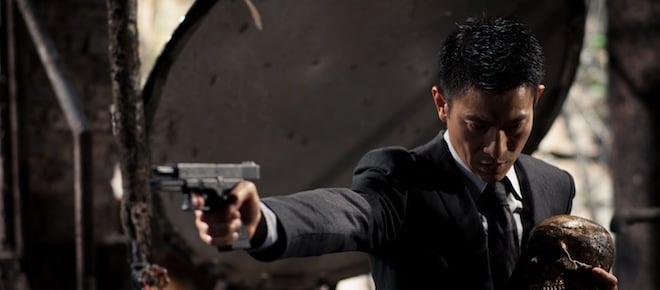TIFF 2013: Director Johnnie To on the future of Chinese cinema
Legendary Hong Kong director Johnnie To in conversation with Barry Hertz
Share

The Toronto International Film Festival features every sort of filmmaker, from the fledgling first-timer to the hardened veteran. Yet few can claim to be in the same league as director Johnnie To. With more than 50 credits to his name, To is an expert chronicler of Hong Kong life, especially its lurid criminal underground, which he’s explored in great detail in Election, Fulltime Killer and The Mission. Yet To is also versatile, sprinkling more personal and intimate films in-between his bloody Triad work. While in Toronto to both promote his latest film, Blind Detective, and discuss the state of international filmmaking as part of TIFF’s Asian Film Summit, To talked to Maclean’s about the future of Chinese cinema and his desire to break into new genres.
Q. You’ve been to Toronto several times before to discuss your work, including a recent talk at the Bell Lightbox. How has the response been from Western audiences in terms of your films?
A. I think Western audiences appreciate more of my personal movies than the audience in Hong Kong, and can see the message I want to bring out. I realize they like my action movies, too, that those are preferred, but there’s also fans of the smaller stuff.
Q. Your films exploring the Chinese gangsters, the Triads, are especially popular here, like your Election series, with fans making often having to make a special effort to seek them out. I know when I was younger, I made regular trips down to Toronto’s Chinatown to find your films.
A. [Laughs] Well, things just aren’t as accessible here as in Hong Kong, certainly. You don’t have the cinemas here in Toronto to show my movies, though many years ago I remember they did have a theatre in Chinatown. But that was, what, 20 years ago?
Q. Yes, there used to be a theatre in the Dragon City mall. The marquee used to be visible until just a few years ago.
A. Yes! In New York, in L.A. and in Toronto there are still the independent cinemas that sometimes show works from Hong Kong, but for people who want to experience it on the big screen, the experience is getting harder and harder. This is why I’m gratefiul and appreciative of the Toronto film festival every year, since they bring in so many movies from Hong Kong and Asia so local audiences, Western audiences, have the chance to screen those films, not just mine.
Q. With so many films to your credit as a director, how do you find the time to balance each project?
A. Because I have so many commercial projects, the action films, I like to take some time in between to work on my personal movies, the projects i really feel committed to and enjoy doing. Many of these, they don’t have scripts—I can’t write scripts—and that’s why they take so long to finish, sometimes two or three years. A lot of the times, when I get stuck with certain things on these movies, I’ll stop and move on to the next project, like a mainstream project. And then I’ll come back. Sparrow, Exile and PTU, these are my personal movies, which were filmed under those situations.
Q. For Blind Detective, what was it like working again with Andy Lau? You have a long history together.
A. My relationship with Andy Lau started back in the ’80s, in television, and every time I work with him, there’s something different—there’s always some changes in the relationship. When I was filiming Running Out of Time, I suggested to him, “Can you try something different this time, with where you’re standing in front of the camera?” and he said yes, but he was totally fed up in the first two weeks of filming. He never had the energy to do more than 30 takes for one shot, but the deal was, well, you’re already committed, and you’re going to listen to me. [Laughs]
He eventually came to terms with it, though, and since then, he’s become a different person. Maybe it’s because he has a daughter and family now, and he is more mature, and less burdened by being an idol. There’s less pressure on his shoulders, and he’s opened up, being as natural an actor as he can be. I really think his performance in Blind Detective is his best.
Q. Have you ever been tempted to work in Hollywood, or with Western actors?
A. I would love to work with Western actors, both to collaborate and to get a chance to learn from them at the same time, to have a different perspective on my movies. But ultimately, I always always always want the movie to happen and film in Hong Kong.
Q. You revealed during your panel discussion that you’re working on a musical drama, something new for you. Is there any other genre you would like to experiment with?
A. I think a martial arts film, a wuxia, would be good. I haven’t touched that genre for years, and the last film I made like that was The Bare-Footed Kid, almost 20 years ago. I shot many TV series like wuxia, with the swordplay and such. But the thing I really want to experiment with is 3D. The technology has improved so much—it’s really promising for Chinese, and world, cinema.